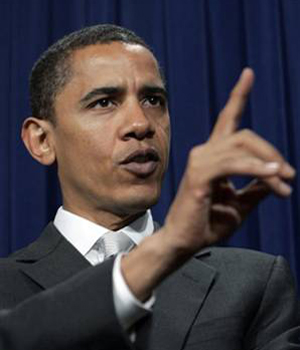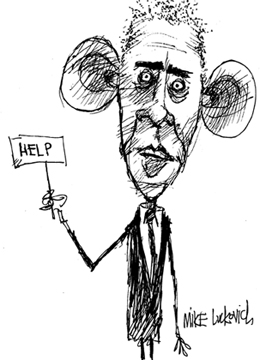I want your money, your children, your private businesses,
control over your personal healthcare, send MILLIONS
TO GAZA/HAMAS, gifts to SYRIA, blah, blah, blah.....!!
Thursday, June 24, 2010
By Barry Rubin
The last pillar of President Barack Obama’s Middle East policy, his alleged popularity in the region, has gone bye-bye. All the apologies, distancing from Israel, the Cairo speech, the Istanbul speech, the engagements with Syria and Iran, the ban on using the word “Islamism,” and all the other apparatus of the new, non-strategic strategy have availed him—and U.S. interests—not.
Why? It’s very simple. On one hand, there are the enemies of America who don’t take that stance just because they thought George W. Bush was icky. They want--depending on who we are talking about--to conquer the Middle East, take over their own countries, establish a Caliphate, lord it over neighbors, wipe Israel off the map, turn women into chattel, get rid of the Christians, expel Western influence from the region, and/or transform their own countries into Islamist utopian dictatorships.
So why should we expect them to care whether the U.S. president is a nice guy who likes them and is really sorry for any time in the past when America actually did or tried to do something in the region? Indeed, Middle East dictators and revolutionaries also believe that nice guys finish last.
Then there are those who depend on the United States for their survival. You may think first of Israel but the list includes pretty much every Arabic-speaking government—more than a dozen—all of them except for Syria, Yemen, Sudan, and the Gaza Strip Islamist dictatorship of Hamas. They want a strong, determined U.S. policy that protects them from their radical enemies at home and abroad. If Washington can't provide that, these rulers seek their own deal with the revolutionaries in order to survive.
Thus, it shouldn’t surprise anyone—but does due to bad ideology and media coverage—that Obama isn’t popular. According to the latest Pew Research Center's Global Attitudes Project poll, he’s gone down in every Muslim-majority country. Only 17 percent of people in Turkey, Pakistan, and Egypt have a positive view of the United States. In Egypt, America is less popular than it was when Bush was president.
And in some cases, Obama is less popular than the United States as a country! In Pakistan 17 percent like America, only 8 percent like Obama, despite billions in U.S. aid rained down unconditionally on that country. In Turkey, he leads the popularity of the United States by only 6 percent.
Of course, the low figures are being spun by administration supporters to suggest that if only the United States pulled out of Afghanistan and Iraq, abandoned Israel completely, and perhaps held its breath until turning blue, this would all change.
Meanwhile, despite all of Obama’s efforts to prove that he isn’t a leader and listens to everyone, most people in the world still think the United States is too unilateral in its actions. And they always will.
It is true America's unpopularity stems from its values. It is also true that America's unpopularity stems from its policies. But that doesn't mean the policies are "wrong." It also doesn't mean that changing these policies will make America popular.
First, the changes would have to be very extreme. Really and fully abandoning Israel, for example, so its people could be wiped out or repressed by anti-American forces.
Second, they would have to go against U.S. interests. Really and fully, perhaps, abandoning Arab regimes so that they are overthrown by anti-American Islamist revolutionaries.
Third, not everyone in the region wants the same thing. For example, U.S. support for Turkey's Islamist regime makes it very unpopular among large segments of the Turkish public, while if government policy were to oppose Egypt's regime as repressive it might alienate as many Egyptians as it would please.
That's why an obsessive hunt for popularity should never be the foundation of policy or strategy. In that framework, for example, a U.S. government might accept a terrorist, revolutionary Islamist, genocidal-oriented, client of Iran on the Mediterranean that would treat women like the Taliban and chase out Christians. Why? Because supporting sanctions to weaken that regime is unpopular in the Muslim-majority world! (And, yes, that's precisely what's happening now.)
A sensible public will stop saying that Obama has succeeded because he made America more popular in the world.
A sensible government would evaluate this situation and all the administration's failures, rethink its world view, and change course. Good news? Well, I said a “sensible government.”
Barry Rubin is director of the Global Research in International Affairs (GLORIA) Center and editor of the Middle East Review of International Affairs (MERIA) Journal. His latest books are The Israel-Arab Reader (seventh edition), The Long War for Freedom: The Arab Struggle for Democracy in the Middle East (Wiley), and The Truth About Syria (PalgraveMacmillan). His new edited books include Lebanon: Liberation, Conflict and Crisis; Guide to Islamist Movements; Conflict and Insurgency in the Middle East; The West and the Middle East (four volumes); and The Muslim Brotherhood. To read and subscribe to MERIA, GLORIA articles, or to order books. To see or subscribe to his blog, Rubin Reports.
The last pillar of President Barack Obama’s Middle East policy, his alleged popularity in the region, has gone bye-bye. All the apologies, distancing from Israel, the Cairo speech, the Istanbul speech, the engagements with Syria and Iran, the ban on using the word “Islamism,” and all the other apparatus of the new, non-strategic strategy have availed him—and U.S. interests—not.
Why? It’s very simple. On one hand, there are the enemies of America who don’t take that stance just because they thought George W. Bush was icky. They want--depending on who we are talking about--to conquer the Middle East, take over their own countries, establish a Caliphate, lord it over neighbors, wipe Israel off the map, turn women into chattel, get rid of the Christians, expel Western influence from the region, and/or transform their own countries into Islamist utopian dictatorships.
So why should we expect them to care whether the U.S. president is a nice guy who likes them and is really sorry for any time in the past when America actually did or tried to do something in the region? Indeed, Middle East dictators and revolutionaries also believe that nice guys finish last.
Then there are those who depend on the United States for their survival. You may think first of Israel but the list includes pretty much every Arabic-speaking government—more than a dozen—all of them except for Syria, Yemen, Sudan, and the Gaza Strip Islamist dictatorship of Hamas. They want a strong, determined U.S. policy that protects them from their radical enemies at home and abroad. If Washington can't provide that, these rulers seek their own deal with the revolutionaries in order to survive.
Thus, it shouldn’t surprise anyone—but does due to bad ideology and media coverage—that Obama isn’t popular. According to the latest Pew Research Center's Global Attitudes Project poll, he’s gone down in every Muslim-majority country. Only 17 percent of people in Turkey, Pakistan, and Egypt have a positive view of the United States. In Egypt, America is less popular than it was when Bush was president.
And in some cases, Obama is less popular than the United States as a country! In Pakistan 17 percent like America, only 8 percent like Obama, despite billions in U.S. aid rained down unconditionally on that country. In Turkey, he leads the popularity of the United States by only 6 percent.
Of course, the low figures are being spun by administration supporters to suggest that if only the United States pulled out of Afghanistan and Iraq, abandoned Israel completely, and perhaps held its breath until turning blue, this would all change.
Meanwhile, despite all of Obama’s efforts to prove that he isn’t a leader and listens to everyone, most people in the world still think the United States is too unilateral in its actions. And they always will.
It is true America's unpopularity stems from its values. It is also true that America's unpopularity stems from its policies. But that doesn't mean the policies are "wrong." It also doesn't mean that changing these policies will make America popular.
First, the changes would have to be very extreme. Really and fully abandoning Israel, for example, so its people could be wiped out or repressed by anti-American forces.
Second, they would have to go against U.S. interests. Really and fully, perhaps, abandoning Arab regimes so that they are overthrown by anti-American Islamist revolutionaries.
Third, not everyone in the region wants the same thing. For example, U.S. support for Turkey's Islamist regime makes it very unpopular among large segments of the Turkish public, while if government policy were to oppose Egypt's regime as repressive it might alienate as many Egyptians as it would please.
That's why an obsessive hunt for popularity should never be the foundation of policy or strategy. In that framework, for example, a U.S. government might accept a terrorist, revolutionary Islamist, genocidal-oriented, client of Iran on the Mediterranean that would treat women like the Taliban and chase out Christians. Why? Because supporting sanctions to weaken that regime is unpopular in the Muslim-majority world! (And, yes, that's precisely what's happening now.)
A sensible public will stop saying that Obama has succeeded because he made America more popular in the world.
A sensible government would evaluate this situation and all the administration's failures, rethink its world view, and change course. Good news? Well, I said a “sensible government.”
Barry Rubin is director of the Global Research in International Affairs (GLORIA) Center and editor of the Middle East Review of International Affairs (MERIA) Journal. His latest books are The Israel-Arab Reader (seventh edition), The Long War for Freedom: The Arab Struggle for Democracy in the Middle East (Wiley), and The Truth About Syria (PalgraveMacmillan). His new edited books include Lebanon: Liberation, Conflict and Crisis; Guide to Islamist Movements; Conflict and Insurgency in the Middle East; The West and the Middle East (four volumes); and The Muslim Brotherhood. To read and subscribe to MERIA, GLORIA articles, or to order books. To see or subscribe to his blog, Rubin Reports.


